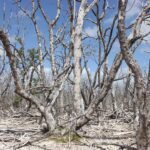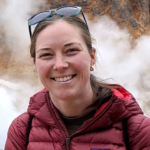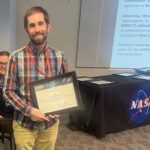AGU unprecedentedly honors Li with Kaufman Award and Fellowship
By Katelyn Newman and Jacob Bell
Over the past several months, Zhanqing Li, a professor at the University of Maryland’s (UMD) Department of Atmospheric and Oceanic Science (AOSC) and the Earth System Sciences Interdisciplinary Center (ESSIC), received two surprising notices from the American Geophysical Union (AGU); that he was the recipient of the organization’s Yoram J. Kaufman Award and would also be elected as an AGU fellow.
AGU’s selection of Li for both prestigious awards is unprecedented and represents the first time the organization will so recognize a member scientist within the same calendar year. Li will receive both honors during presentations at this December’s annual meeting of the American Geophysical Union in San Francisco, CA, USA.
…
In a recent discussion with award-winning scientist Zhanqing Li, the professor candidly admitted that he wasn't immediately drawn to meteorological study.
“I don’t think I was born to like meteorology,” said Li, a professor for UMD’s Department of Atmospheric and Oceanic Science (AOSC) and researcher for the Earth System Sciences Interdisciplinary Center (ESSIC).
“Even at the time when I went to university, I knew little about meteorology. Once I was admitted to the [Nanjing Institute of Meteorology in China], I gradually became fond of it and I’ve found that meteorology is a discipline that really has very high value for society.”
Li’s eventual warming to the study of the atmosphere has indeed produced dividends on both the societal and scientific fronts.
Li’s efforts as a researcher, educator, and collaborator were recently singled-out for recognition by the prestigious American Geophysical Union (AGU), on two distinct occasions.
AGU’s Atmospheric Section named Li the 2014 recipient of the Yoram Kaufman Award for his accomplishments and collaborations in the research of aerosols in the atmosphere over the past decade.
The award is distributed annually to an atmospheric scientist who continuously shows “broad influence in atmospheric science through exceptional creativity, inspiration of younger scientists, mentoring, international collaborations, and unselfish cooperation in research.”
“I think the award, even though just for me personally, really is a reward of the many talented people whom I have fortunately worked with over so many years,” said Li, including over a dozen PhD students and multiple postdoctoral fellows. “We try to help each other, and try to gain from each other.”
For former student Michael Fromm, Li provided him the opportunity to pursue his PhD interests and reach his goals despite having a full-time job.
“What I saw in Dr. Li was a real enthusiasm for engaging others in research,” said Fromm, who now works at the Naval Research Laboratory in Washington, D.C. “He certainly is a great candidate for the Kaufman Award.”
Another former PhD student Ruiyue Chen noted Li’s encouragement and support in seeking out new challenges, as well as his penchant for collaboration, particularly on the international stage.
“He not only likes to encourage us to take challenges, he helped us a lot to take those challenges,” said Chen, who now works for the National Oceanic and Atmospheric Administration (NOAA). He’s [also] very active in the international collaboration for atmospheric research.”
Indeed, Li’s extensive portfolio of research collaborations was an important factor in his Kaufman selection.
Since 2004, Li has collaborated with multiple institutions in China to pursue US-China joint research projects. Two projects were particularly noteworthy: East Asian Study of Tropospheric Aerosol and International Regional Experiment (EAST-AIRE) and East Asian Study of Tropospheric Aerosols and Impact on Regional Climate (EAST-AIRC).
In these projects, Li and his team of researchers established 25 stations across China, conducting several intensive field experiments to analyze the effects of human-produced emissions of aerosols on the energy and water cycle.
“Aerosols emitted in any region affect not only human health and the environment in the local area, its climate impact may go far beyond the source region due to atmospheric circulation, Some dust storms originated in the Asian Gobi desert traveled across the Pacific rim to reach North America in a matter of one to two weeks,” said Li. “As climatologists, we must view the earth as a system and tackle with regional problems from a global perspective. It is thus essential to conduct international collaborative studies.”
Li said he will continue researching aerosols’ effects on climate, clouds and precipitation, but also plans to continue with his work on radiation, “which matters to all things in both climate and human life.”
On the heels of his Kaufman award selection, Li was subsequently elected as a Union Fellow this past July, for his accomplishments within the field of atmospheric sciences.
According to AGU, Unions Fellowship was established in 1962 to recognize AGU members who have attained acknowledged eminence in the Earth and space sciences as valued by their peers and vetted by a Union-wide committee of Fellows.
“Only 0.1% of the AGU membership can be chosen to be a Fellow in any given year, said Dr. James Carton, chair of AOSC, so it’s a great honor for Professor Li to have been chosen.”
Li stated that he was surprised by both his selection into the fellowship program and the volume of congratulatory email he subsequently received. He and the 61 other new Fellows – 11 being atmospheric scientists – will be recognized for their accomplishments during the award presentation portion of the fall 2014 AGU Meeting. The presentations will be followed by an honors banquet.
“To be selected as an AGU Fellow is recognition of a sustained scientific impact over a long time period,” said Dr. Anthony Del Genio, a scientist for the NASA Goddard Space Studies in New York. “To win both these awards means that Zhanging's peers view him not only as a top-tier climate scientist, but a great colleague to work with as well.”
“Only one in a thousand members is elected to Fellowship each year,” said Professor Antonio Busalacchi, director of ESSIC. “To be recognized by one's peers to be a Fellow of the AGU is an affirmation of the world-class research and talent we have at ESSIC.”





